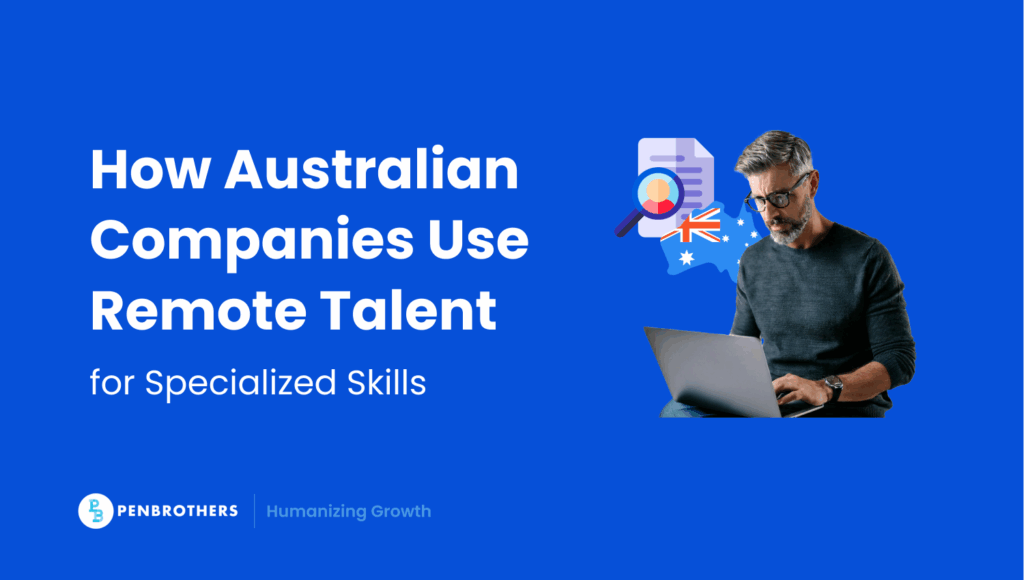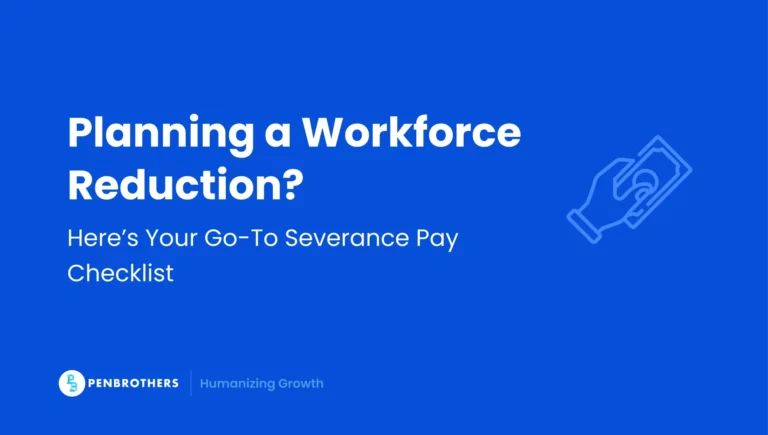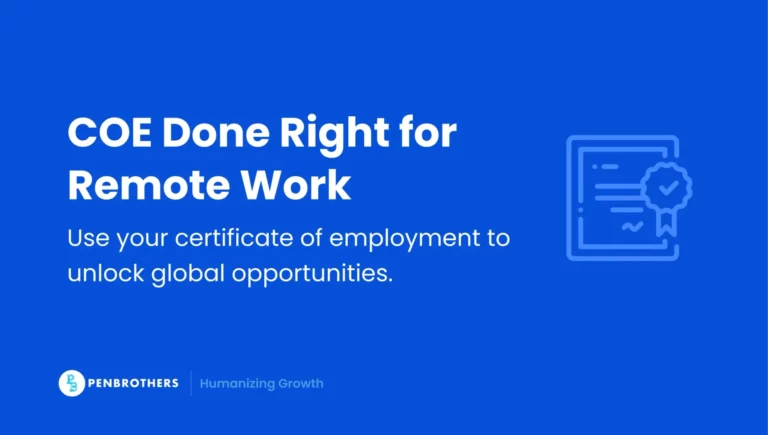Key Takeaways
- Outsourcing is a Strategic Solution to Australia’s Talent Crisis: The central driver for Australian companies is no longer cost, but overcoming a critical domestic talent shortage in high-demand fields like IT, accounting, and customer support. Offshore teams provide a strategic way to access specialized, qualified talent that is often impossible to find locally.
- Significant Cost Savings are Paired with High Quality: Remote hiring offers massive financial benefits, with cost savings often reaching 60% compared to local Australian salaries. This enables businesses to hire specialized roles, like Software Developers and Cybersecurity Analysts, without ballooning their budget.
- A Wide Range of High-Value Roles are Outsourced: The outsourcing trend is expanding far beyond basic administration. Australian companies are engaging remote professionals for a diverse set of specialized, high-value roles, including Cloud Engineers, Data Analysts, Digital Marketing Specialists, and Legal & Compliance Specialists.
- Scalability and Flexibility are Core Benefits: Hiring remote professionals allows Australian businesses to adjust their workforce size quickly based on project demands or seasonal spikes. This scalability and flexibility are crucial for maintaining a competitive edge in a dynamic global market.
In recent years, the demand for specialized skills in Australia has surged. However, local talent shortages have made it challenging for businesses to fill critical roles. To bridge this gap, many companies are turning to remote professionals, leveraging global talent pools to meet their needs. This approach not only addresses skill shortages but also offers cost-effective and scalable solutions.
The Growing Need for Remote Professionals in Australia
Australia faces significant skills gaps across various industries, including IT, accounting, and customer support. High local labor costs and workforce shortages exacerbate these challenges, making it difficult for companies to attract and retain top talent. The shift towards remote work has become a viable solution, allowing businesses to access specialized skills beyond their geographical boundaries. According to 2024 data, 36.3% of employed Australians work from home regularly, a stable figure that confirms remote work is a permanent fixture in the economy.
Key Benefits of Hiring Remote Talent
Australian companies are increasingly recognizing the advantages of engaging remote professionals:
- Access to Specialized Skills: By tapping into a global talent pool, businesses can find experts with the precise skills they require.
- Improved Productivity: Remote teams operating across different time zones can facilitate extended operational hours, enhancing productivity.
- Scalability and Flexibility: Remote staffing allows businesses to adjust their workforce based on project demands, providing greater flexibility.
- Business Resilience: Diversifying the workforce with remote professionals reduces operational risks and enhances adaptability.
- Cost Savings: Employing remote talent can lead to significant savings in salaries and overhead costs.
A report by McKinsey & Company indicates that sectors like finance and insurance have the highest potential for remote work, with up to 75% of tasks being performed remotely without loss of productivity.
Explore the key benefits of remote work in our guide on Building an Effective Offshore Team.
Commonly Outsourced Specialized Roles and Cost Comparison
Companies are outsourcing a variety of specialized roles across different sectors. Below are some commonly outsourced positions along with potential cost savings:
Software Developers
Experts in designing, building, and maintaining web and mobile applications, ensuring seamless digital transformation and scalability.
Cybersecurity Analysts
Experts in safeguarding businesses from complex digital threats, ensuring robust security measures, and compliance with global standards.
Cloud Engineers & DevOps Specialists
Professionals who optimize cloud infrastructure, automate workflows, and enhance system reliability for businesses operating in dynamic digital environments.
Accountants & Bookkeepers
Financial experts manage accounts, payroll, and tax compliance, helping businesses maintain accuracy and efficiency while reducing overhead costs.
Administrative Assistants
Administrative professionals who handle scheduling, email management, and clerical tasks, allowing businesses to focus on high-priority activities.
Marketing Specialists
Strategists who drive brand awareness, SEO, paid advertising, and content marketing, optimizing online presence and lead generation.
Customer Support Specialists
Frontline professionals provide real-time assistance via phone, email, and chat, ensuring excellent customer service and satisfaction.
Data Analysts & Business Intelligence Specialists
Experts in interpreting complex data sets, generating insights, and supporting data-driven decision-making for business growth.
Legal & Compliance Specialists
Professionals ensure legal adherence, contract management, and risk mitigation, safeguarding businesses from regulatory challenges.
Graphic Designers & UI/UX Specialists
Creative professionals specializing in branding, website design, and user experience, enhancing visual communication and engagement.
Penbrothers’ Success Story
How an Australian Company Achieved 75% Cost Savings Through Remote Professionals
To scale efficiently while managing rising workloads, The LOTE Agency, an Australian communications firm, partnered with Penbrothers to access top Filipino talent. This allowed them to expand quickly, maintain service quality, and significantly cut labor costs.
Key Results:
✅ 75% cost savings through offshoring.
✅ Rapid hiring in just 20 days for skilled roles.
✅ Increased capacity to handle more clients.
✅ Seamless HR management for payroll, benefits, and compliance.
With offshore teams handling project support, The LOTE Agency’s in-house staff focused on strategic growth and client engagement—achieving flexibility and efficiency in a fast-changing market.
Next Steps
Embracing remote professionals is a strategic move for Australian businesses aiming to optimize costs and access specialized skills. To get started:
- Define Your Needs: Identify the specific roles and skills required.
- Choose the Right Partner: Collaborate with a reputable offshore staffing company like Penbrothers.
- Establish Processes: Set up workflows, communication channels, and performance metrics.
- Utilize Collaboration Tools: Implement platforms such as Slack, Zoom, and Asana to streamline operations.
- Monitor and Optimize: Continuously assess performance and make necessary improvements.
The future of work is evolving, and businesses that adapt by leveraging remote talent will maintain a competitive edge. Penbrothers is ready to assist Australian companies in building high-performing remote teams.
Looking to hire remote professionals? Let’s talk.
Frequently Asked Questions
The primary reasons are to address significant skill shortages across Australian industries (IT, accounting, etc.) and to achieve major cost savings compared to high local labor rates. This allows them to access a global pool of specialized talent.
The cost savings are substantial. Companies can achieve savings of 60% or more on salary costs for many specialized roles. For example, a Software Developer in Australia might cost AUD $103,326 – $142,688 annually, while a counterpart in the Philippines can be hired for approximately AUD $40,072 – $67,307.
The most frequently outsourced specialized roles include Software Developers, Cloud Engineers & DevOps Specialists, Cybersecurity Analysts, Accountants & Bookkeepers, and Data Analysts. These are high-demand technical and professional positions that are difficult to fill locally.
The biggest strategic benefit is access to specialized skills and scalability. By tapping into the global talent pool, companies can find the exact expertise they need and quickly adjust their workforce size based on project needs, ensuring business resilience and enhanced productivity.






